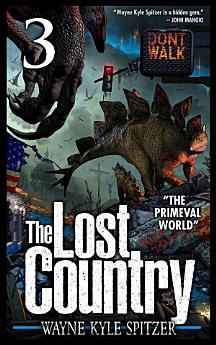The Lost Country, Episode Three: “The Primeval World”
About this ebook
How did it all begin? Well, that depends on where you were and who you ask. In some places it started with the weather—which quickly became unstable and began behaving in impossible ways. In still others it started with the lights in the sky, which shifted and pulsed and could not be explained. Elsewhere it started with the disappearances: one here, a few there, but increasing in occurrence until fully three quarters of the population had vanished. Either way, there is one thing on which everyone agrees—it didn’t take long for the prehistoric flora and fauna to start showing up (often appearing right where someone was standing, in which case the two were fused, spliced, amalgamated). It didn’t take long for the great Time-displacement called the Flashback—which was brief but had aftershocks, like an earthquake—to change the face of the earth. Nor for the stories, some long and others short, some from before the maelstrom (and resulting societal collapse) and others after, to be recorded.
Welcome to the Lost Country.
From “The Primeval World”:
I stood abruptly and raised the back of my hand—but was restrained by Linda, who had inserted herself between us. “That’s enough! Please—Chris. Enough. She’s not going to tell us.” She backed me away from the girl. “But I have an idea … if you want to hear it.”
I yanked away from her and began pacing, furious at the stranger but really angry with myself—for losing my cool in front of my crush, whom I’d liked since the moment we’d met (at the Coke machine in the Community Room, about a month before the Flashback). And for sending them—Penny and Fred—to the food mart in the first place, ostensibly to save time but really just so I could be with Linda.
“I—I’m sorry. Jesus. It’s just that—”
She came to me and put a finger to my lips. “Shhh. Forget it. All right?” I tried to look away but she forced me to look at her. “All right? Listen. We know which direction they went. So … why don’t we just—take Valerie here—and go looking for them?”
She turned to face the young woman. “She’ll point us in the right direction—won’t you, Little Miss Sunshine?” She glared at her menacingly. “If she ever wants to see home again.”
And she was right, of course; I knew it and the girl knew it.
And so I reconfigured her bonds so she could travel and we doused ourselves in rex urine— including Valerie (for who knew how far we’d have to go or how long we’d be exposed to potential predators), and we headed out; walking up South Union Avenue toward the capitol even as Compies watched from the undergrowth and I thought I saw a face: simian yet strangely human, animal, and yet somehow not—peeking at us briefly from between two fronds. Staring at us, passively, almost meditatively, like a great ape behind glass; or a manatee through green, hazy water.
About the author
Wayne Kyle Spitzer is an American writer, illustrator, and filmmaker. He is the author of countless books, stories and other works, including a film (Shadows in the Garden), a screenplay (Algernon Blackwood’s The Willows), and a memoir (X-Ray Rider). His non-fiction writing has appeared in subTerrain Magazine: Strong Words for a Polite Nation and Columbia: The Magazine of Northwest History. He holds a Master of Fine Arts degree from Eastern Washington University, a B.A. from Gonzaga University, and an A.A.S. from Spokane Falls Community College. His recent fiction includes The Man/Woman War cycle of stories as well as the Dinosaur Apocalypse Saga. He lives with his sweetheart Ngoc Trinh Ho in the Spokane Valley.











